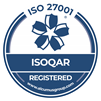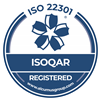The best online tools to help you and your business
The web is a wonderful place providing countless possibilities.
Online & Tech
We think that you have probably come across the acronym SEO before. If you haven't, it stands for Search Engine Optimisation. It is essentially the process of catering a web page towards a search engine - usually Google.
This is done through getting ranked under key search terms or phrases related to your business. So, for example, if you run a local coffee shop you might want your businesses website to be viewable under a term like ‘coffee to go’ or ‘coffee shops’. But, the issue with SEO is that you will often find that the big brands will get highly ranked under the popular broader terms. They will have larger marketing budgets and dedicated SEO teams to help their companies rank as highly as possible. For a small local business, it's important to be realistic about what you can do.
Which is why it pays to make your SEO local, but what do we mean by this exactly?
To put it simply, it’s about getting your business found by targeting localised keywords in terms of where your business is based. For instance, you might be better placed to take the previously mentioned Coffee scenario and target phrases more apt to your region. So, if you have a Coffee shop based in the Northern Quarter in Manchester then try and target the phrase ‘Coffee shop northern quarter’ as that is more regionally specific. If you are a small business then you are more likely to get success going for this type of tactic, as it will get you seen by the people who will make a difference to your footfall: your local community. But, how do you go about creating a local SEO strategy that will really work? Well we’re glad that you asked…
Creating a local SEO strategy is multifaceted and requires that your business has a presence on a number of different platforms and directories to really get you noticed. There are a few ways that this can be done. We would highly suggest the following:
Google my business - They seem to do everything don’t they? But Google are known to be outstanding in giving businesses of all sizes a visual presence and this platform should be something you sign up to - without question. Think of it as a large directory but one that everyone, including many of your direct competitors, will be listed on.
NAP (Name, address phone citation) - It’s very important that these basic details show up on your search page. A common mistake for many small businesses is not to have these details on display for search engines. This is not something we recommend. Google will use these details when assessing your site authority, so ensure that it matches the address you give both on your website and on your Google my business page.
Meta description and other on page factors - This concerns the back end of your site and the coding that goes into it. You might think this is something that you won’t be able to see, so it should be left to a programmer, but, on the contrary; on page factors will directly affect what you will see, particularly on the search engines themselves. Your meta description on your search engine ranking page (SERPS) will have a description coming from your website. This description needs to be accurate and to the point in terms of spelling out what your business does and more importantly where it’s based. Make sure this is no longer than 50- 60 characters. Equally, you will want to make sure that your title tags within your HTML are as optimised as possible.
Business directories - Another factor that you should consider adding to your local SEO mix is getting your business listed in online directories. This is a great way of standing out and very helpful for people who are looking for a local business which offers your kind of service. This is why a platform like Yelp is particularly good in helping gain a more local presence.
Find out if your local newspaper has a listing page on their site or even approach your local council and see if they have any of their own directories for you to be listed on. The more regional you go the better your business will be for it. As well as getting a directory it’s worth considering a link building strategy on local sites which redirect straight to your business’s webpage. Which leads directly to…
Local outreach - Why not go about highlighting all the great things that your area has to offer. Create compelling content which goes into detail about what your area has to offer. Write some blog posts which cover this then share it on social media. And while you’re at it tag local businesses and influencers on Twitter and Facebook. This is a great way to make your business visible and noticed within the local community.
Payzone are dedicated to supporting small to medium-sized UK businesses with our range of card payment solutions.

The web is a wonderful place providing countless possibilities.

Let’s have a look at exactly why we think eCommerce is the way forward.

Branding is a way of defining your business for yourself and your audience.
Payzone Bill Payments Limited Registered Office: 100 Wood Street, London, England. EC2V 7ER. Registered in England and Wales No. 11310918 VAT Number: GB 172670502. Payzone site uses cookies. Some of these cookies are essential, while others help us to improve your experience by providing insights into how the site is being used. View our Cookie Policy and our Privacy Policy.




Cert No. 9819